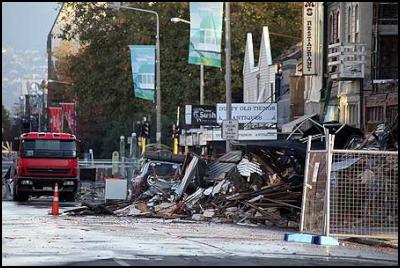Disasters, diasporas, dream homes – Massey talks
Thursday, January 26, 2017

Caption:
Christchurch after the 2011 quake
(Wikimedia)
Disasters, diasporas, dream homes – Massey talks
How do we best cope after a natural disaster? Who do we allow to migrate here? What's with the growing distrust in politics ahead of this year’s election? With the housing crisis and associated insecurities? Massey University speakers – in a series of public talks starting next month – will tackle these hot button issues.
The Our Changing World series is a response to “unprecedented world events that call for a better understanding of the country we live in,” says Distinguished Professor Paul Spoonley, Pro Vice-Chancellor for the College of Humanities and Social Sciences, which is hosting the free public lectures at the Auckland campus in Albany.
In Are natural disasters the new norm? – the first of five lectures and panel discussions this year –Professor David Johnston, from the Joint Centre for Disaster Research, will explore the social impact of natural disasters for New Zealanders.
The devastating 2011 Christchurch Earthquake was the country’s first major natural disaster in 80 years, with an estimated cost of 40 billion dollars. Five years later, the 2016 Kaikoura Earthquake wreaked havoc along important transport routes with the rebuild also projected to reach billions of dollars. The geological impacts of both these earthquakes continue to be ongoing.
The potential loss of loved ones, property and livelihood is becoming the new reality for many, while others watch through a media lens. Professor Johnston will ask: how does the country come together, and how do we cope with natural disaster and sustain a united and socially compassionate response?
Prior to his February 2 talk, he emphasises that the capital city, home to Parliament, Defence Headquarters, National Archives and the majority of the country’s Government Departments and Ministries is located between two of Earth’s major tectonic plates and perched upon one of the most active geological zones, aptly named the Wellington Fault.
“Recent damage as a result of the 2016 Kaikoura quake highlighted the vulnerability of this important city,” he says. “The changing physical environment of New Zealand is significantly impacting on our economy, politics and society.”
Other topics are:
* People on the move: April 6
Experts from the Chinese programme, politics, sociology, education and classical studies will discuss global and local mobility and various immigration trends. Dr Jia Ge, Dr Liangni Sally Liu, Dr Fiva Faalau and Dr Jodie Hunter will examine the implications for New Zealand of accommodating the diverse needs of refugees fleeing danger and economic migrants seeking a better life.
* Trust, distrust and the end of politics as we knew it: June 1
Politics experts will delve into the question: What might the election of Donald Trump to the summit of American political power mean for New Zealanders? And should we really be all that shocked? Seasoned commentators and observers of local and international political trends Associate Professor Grant Duncan, Dr Warwick Tie and Dr Damien Rogers will explore the evolving global and local political landscapes of liberal democracies to fathom what it all means – for us in New Zealand, and for the future of neoliberalism more broadly.
* Has our quarter acre dream become a housing crisis?: August 3
The so-called “Kiwi dream” of owning one’s home is increasingly unrealistic for increasing numbers of people. School of Psychology specialists on poverty will examine how and why we’ve arrived at the current situation, whereby we live in an increasingly divided society where some people own multiple properties and in doing so shut others out of home ownership.
Professors Darrin Hodgetts, Stuart Carr and Kerry Chamberlain will talk about the numerous implications of New Zealand’s housing crisis and housing insecurity, such as working poverty and non-living wages versus sustainable livelihoods, and address how we might best meet one of human being’s most basic needs – a home – in New Zealand today.
• Navigating troubled waters – NZ in contemporary world affairs: October 5
New Zealand and the United States have recently fostered closer defence relations. In this panel discussion, Professor Rouben Azizian and Dr Anna Powles, from the Centre for Defence and Security Studies, will be joined by fellow academics to explore the Asia-Pacific region’s changing security landscape. They will discuss the potential roles that New Zealand might usefully play in and around the Asia-Pacific, especially as tensions rise over North Korea’s nuclear weapons programme, China’s territorial claims over parts of the South China Sea, and the potential changes to US foreign policy under the Trump Administration.
All lectures will be held in the Round Room, Atrium Building, from 6pm – 7.30pm.
For more information or to register click here.


 Water Safety New Zealand: Don’t Drink And Dive
Water Safety New Zealand: Don’t Drink And Dive NZ Olympic Committee: Lydia Ko Awarded Lonsdale Cup For 2024
NZ Olympic Committee: Lydia Ko Awarded Lonsdale Cup For 2024 BNZ Breakers: BNZ Breakers Beaten By Tasmania Jackjumpers On Christmas Night
BNZ Breakers: BNZ Breakers Beaten By Tasmania Jackjumpers On Christmas Night Te Whatu Ora Health NZ: Health Warning – Unsafe Recreational Water Quality At Roto Kohatu Reserve At Lake Rua
Te Whatu Ora Health NZ: Health Warning – Unsafe Recreational Water Quality At Roto Kohatu Reserve At Lake Rua Shearing Sports NZ: Shearing Them Around - 11 Shearing Records In 2024
Shearing Sports NZ: Shearing Them Around - 11 Shearing Records In 2024 The New Zealand Retro: Special End Of Year Retro Chart Show On Independent Radio Stations
The New Zealand Retro: Special End Of Year Retro Chart Show On Independent Radio Stations